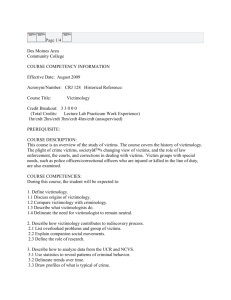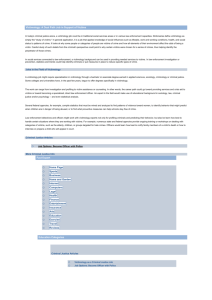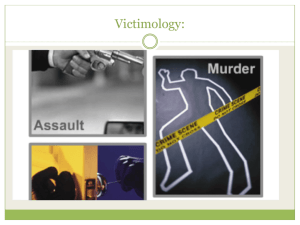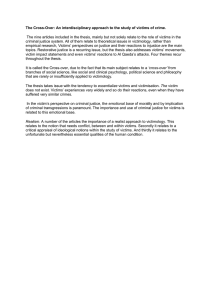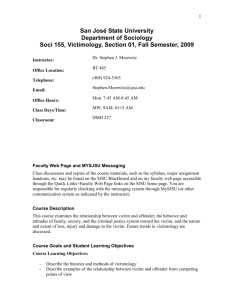San José State University Department of Sociology
advertisement
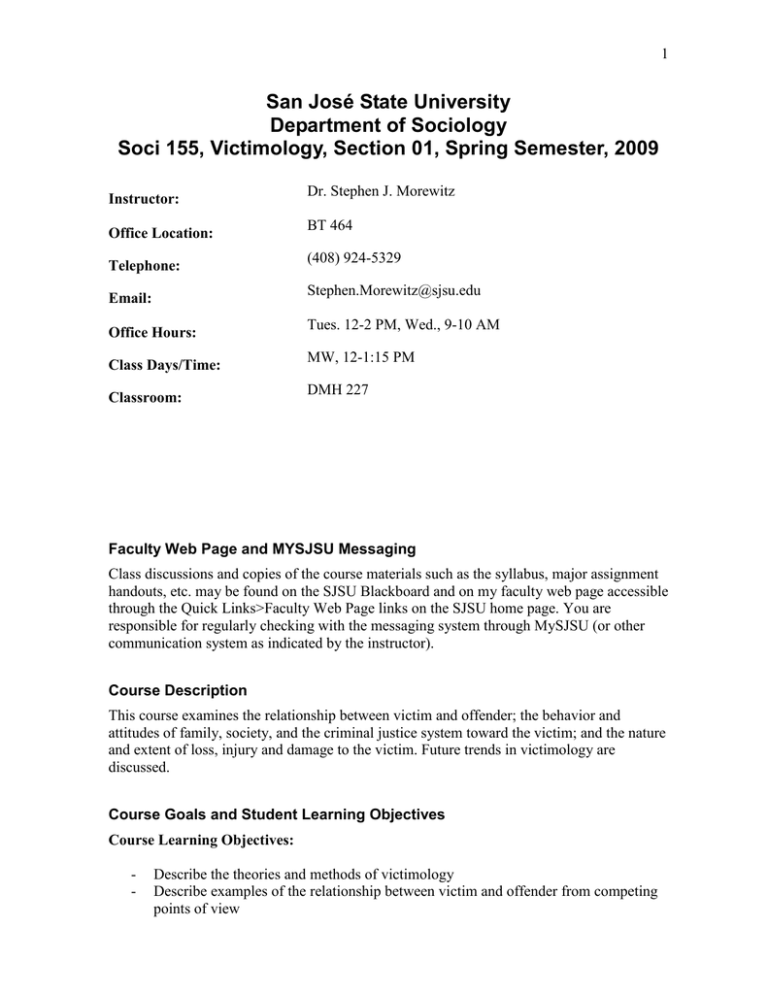
1 San José State University Department of Sociology Soci 155, Victimology, Section 01, Spring Semester, 2009 Instructor: Office Location: Telephone: Dr. Stephen J. Morewitz BT 464 (408) 924-5329 Stephen.Morewitz@sjsu.edu Email: Office Hours: Class Days/Time: Classroom: Tues. 12-2 PM, Wed., 9-10 AM MW, 12-1:15 PM DMH 227 Faculty Web Page and MYSJSU Messaging Class discussions and copies of the course materials such as the syllabus, major assignment handouts, etc. may be found on the SJSU Blackboard and on my faculty web page accessible through the Quick Links>Faculty Web Page links on the SJSU home page. You are responsible for regularly checking with the messaging system through MySJSU (or other communication system as indicated by the instructor). Course Description This course examines the relationship between victim and offender; the behavior and attitudes of family, society, and the criminal justice system toward the victim; and the nature and extent of loss, injury and damage to the victim. Future trends in victimology are discussed. Course Goals and Student Learning Objectives Course Learning Objectives: - Describe the theories and methods of victimology Describe examples of the relationship between victim and offender from competing points of view 2 - Describe the behavior and attitudes of family, society, and the criminal justice system toward the victim Identify the nature and extent of loss, injury, and damage to the victim Describe future trends in victimology Course Content Learning Outcomes Upon successful completion of this course, students will be able to: - LO1 Describe the theories and methods of victimology L02 Describe examples of the relationship between victim and offender from competing points of view L03 Describe the behavior and attitudes of family, society, and the criminal justice system toward the victim L04 Identify the nature and extent of loss, injury, and damage to the victim L05 Describe future trends in victimology Required Texts/Readings Textbook Crime Victims. An Introduction to Victimology (6th edition), 2007. Andrew Karmen. Publisher: Thomson Wadsworth. ISBN: 9780495006039 (Available at Spartan Bookstore and on the Web) Stalking and Violence. New Patterns of Trauma and Obsession (1st edition), 2003. Stephen J. Morewitz. Publisher: Kluwer Academic/Plenum Publishers/Springer Science+Business Media, LLC. ISBN: 9780306473654 (Available at Spartan Bookstore and on the Web) Controversies in Victimology (latest edition), Laura J. Moriarty. Publisher: Anderson Publishing. ISBN: 9781583605110 (Available at Spartan Bookstore and on the Web) Other Readings Additional readings from the Internet may be recommended. Classroom Protocol Class Participation. Attendance is mandatory and is a pre-condition for class participation. Students are expected to read the assigned readings before each class and come to class prepared to discuss these readings. During class, students should not surf the Web or use any other electronic devices unless it is for class-related purposes. Dropping and Adding Students are responsible for understanding the policies and procedures about add/drops, academic renewal, etc. Information on add/drops are available at http://info.sjsu.edu/webdbgen/narr/soc-fall/rec-324.html . Information about late drop is available at 3 http://www.sjsu.edu/sac/advising/latedrops/policy/ . Students should be aware of the current deadlines and penalties for adding and dropping classes. Assignments and Grading Policy The grades for this course will be based on the weighted combination of: 1) Midterm, 2) Final Exam, 3) Victimology Field Interview Project, 4) Victimology Debate Project, 5) Class participation. A brief description of these activities and grading scale is listed below. 1) The Midterm (3/16) is multiple choice and true/false. It will be based on the readings, class lectures, and class discussions. 2) The Final Exam is multiple choice and true/false (See the SJSU final exam schedule for the time and day of the final quiz). It will be based on the readings, class lectures, video presentations, and class discussions. 3) The Victimology Field Interview Project paper will be about a 4-page paper (+ research references and other attachments). The project paper will be presented in class using a powerpoint format beginning 3/23. Students will be asked to work in small groups to conduct a victimology research-oriented field interview with an approved organization. These field interviews will analyze a victimology issue or problem based on a review of the victimology research literature 4) The Victimology Debate Project paper will be a 4-page paper (+ research references and other attachments). Students will be asked to work in small groups to plan and carry out an in-class debate based on a review of the victimology research literature. The Victimology Debates will be presented in class using a powerpoint format beginning 4/8. 5) Class Participation. Students will be asked to participate in class activities and view video/powerpoint presentations. Students will prepare written questions and answers related to these activities and receive credit for their participation. Each of these assignments is designed to help students meet all of the five Course Learning Objectives and five Content Learning Objectives listed above. GRADING CRITERIA FOR EACH MAJOR WRITING ASSIGNMENT Relevance to the field (5 points) Adequacy of literature review (25 points) Adequacy of the structure/organization of paper and/or research methods (if used) (25 points) Adequacy of major theories and/or findings (25 points) Creativity (10 points) 4 Logic/Grammar (10 points) Grading Scale: Midterm Final Exam Field Interview Debate Particip 25% 25% 20% 20% 10% 92.1%-100% = A 90 %-92% =A88%-89.9% = B+ 82.1%–87.9% = B 80%-82% = B78%-79.9%=C+ 72.1%-77.9% = C 70%-72% = C68%-69.9% = D+ 62.1%-67.9% = D 60%-62% = D- Late Assignment Policies: 1. Late Assignments: Assignments such as term papers will lose credit for every class meeting that they are late. These assignments must be turned in by hand during class. They must also be stapled! Papers over two weeks late will not be accepted unless a prior arrangement has been made with me. If you foresee a problem with meeting a deadline, you need to speak with me about it as soon as possible. Waiting until the last minute is not a good idea. Late exams need to be taken as soon as possible, and I need to be informed of your absence should it occur on an exam date. Academic Integrity Students should know that the University’s Academic Integrity Policy is availabe at http://www.sa.sjsu.edu/download/judicial_affairs/Academic_Integrity_Policy_S07-2.pdf. Your own commitment to learning, as evidenced by your enrollment at San Jose State University and the University’s integrity policy, require you to be honest in all your academic course work. Faculty members are required to report all infractions to the office of Student Conduct and Ethical Development. The website for Student Conduct and Ethical Development is available at http://www.sa.sjsu.edu/judicial_affairs/index.html. Instances of academic dishonesty will not be tolerated. Cheating on exams or plagiarism (presenting the work of another as your own, or the use of another person’s ideas without giving proper credit) will result in a failing grade and sanctions by the University. For this class, all assignments are to be completed by the individual student unless otherwise specified. If you would like to include in your assignment any material you have submitted, or plan to submit for another class, please note that SJSU’s Academic Policy F06-1 requires approval of instructors. Campus Policy in Compliance with the American Disabilities Act If you need course adaptations or accommodations because of a disability, or if you need to make special arrangements in case the building must be evacuated, please make an appointment with me as soon as possible, or see me during office hours. Presidential Directive 97-03 requires that students with disabilities requesting accommodations must register with the DRC (Disability Resource Center) to establish a record of their disability. 5 Student Technology Resources Computer labs for student use are available in the Academic Success Center located on the 1st floor of Clark Hall and on the 2nd floor of the Student Union. Additional computer labs may be available in your department/college. Computers are also available in the Martin Luther King Library. A wide variety of audio-visual equipment is available for student checkout from Media Services located in IRC 112. These items include digital and VHS camcorders, VHS and Beta video players, 16 mm, slide, overhead, DVD, CD, and audiotape players, sound systems, wireless microphones, projection screens and monitors. Learning Assistance Resource Center The Learning Assistance Resource Center (LARC) is located in Room 600 in the Student Services Center. It is designed to assist students in the development of their full academic potential and to motivate them to become self-directed learners. The center provides support services, such as skills assessment, individual or group tutorials, subject advising, learning assistance, summer academic preparation and basic skills development. The LARC website is located at http:/www.sjsu.edu/larc/. SJSU Writing Center The SJSU Writing Center is located in Room 126 in Clark Hall. It is staffed by professional instructors and upper-division or graduate-level writing specialists from each of the seven SJSU colleges. Our writing specialists have met a rigorous GPA requirement, and they are well trained to assist all students at all levels within all disciplines to become better writers. The Writing Center website is located at http://www.sjsu.edu/writingcenter/about/staff//. Peer Mentor Center The Peer Mentor Center is located on the 1st floor of Clark Hall in the Academic Success Center. The Peer Mentor Center is staffed with Peer Mentors who excel in helping students manage university life, tackling problems that range from academic challenges to interpersonal struggles. On the road to graduation, Peer Mentors are navigators, offering “roadside assistance” to peers who feel a bit lost or simply need help mapping out the locations of campus resources. Peer Mentor services are free and available on a drop –in basis, no reservation required. The Peer Mentor Center website is located at http://www.sjsu.edu/muse/peermentor/ . 6 Soci 155-01/ Victimology, Spring 20009, Course Schedule The schedule is subject to change with fair notice, and students will be notified by email. Week Date Topics, Readings, Assignments, Deadlines 1 1/26, 1/28 Purchase textbooks. Plan projects & select team members Chapter 1 “What is Victimology?” in Karmen (K) Morewitz, 2003 (read chapters at your own pace) 2 2/2, 2/4 Chapter 2 “The Rediscovery of Crime Victims,” in K Moriarty, Chapter 4 “The Mass Media and the Victims of Rape,” Morewitz, 2003 3 2/9, 2/11 Chapter 3 “Sources of Information about Crime Victims: The UCR and the NCVS,” and Chapter 4 “Violent Crimes: Murders and Robberies,” in K Morewitz, 2003 4 2/16 (No Class), 2/18 Chapter 5 “The Victims’ Contribution to the Crime Problem,” in K Moriarty, Chapter 2 “Victim Blaming” Morewitz, 2003 5 2/23, 2/25 Chapter 6 “Victims and the Criminal Justice System: Cooperation and Conflict; Part One: The Police,” in K Morewitz, 2003 6 3/2, ¾ Chapter 7 “Victims and the Criminal Justice System: Cooperation and Conflict; Part Two: Prosecutors, Defense Attorneys, Judges, and Correctional Officials,” in K Moriarty, Chapter 6 “Fear of Crime and Victimization” Morewitz, 2003 7 3/9, 3/11 Chapter 8 “Children as Victims,” in K Morewitz, 2003 8 3/16, 3/18 Midterm (3/16) Chapter 9 “Victims of Violence by Lovers and Family Members” in K 7 Week Date Topics, Readings, Assignments, Deadlines Moriarty, Chapter 5 “The Tradition and Reality of Domestic Violence,” Morewitz, 2003 9 3/23, 3/25 Victimology Field Interview Project paper will be presented in class beginning 3/23. Chapter 10 “Victims of Rapes and Other Sexual Assaults in K Moriarty, Chapter 3 “The Role of Alcohol in Victimization,” and Chapter 4 “The Mass Media and Victims of Rape,” Morewitz, 2003 10 3/30, 4/1 Chapter 11 “Other Groups of Victims Whose Problems Are No Longer Overlooked,” in K Morewitz, 2003 11 4/6, 4/8 Chapter 12 “Repaying Victims,” in K Moriarty, Chapter 7 “Restoration and the Criminal Justice System,” Morewitz, 2003 The Victimology Debates will be presented beginning 4/8. 12 4/13, 4/15 Moriarty, Chapter 7 “Restoration and the Criminal Justice System,” Morewitz, 2003 13 4/20, 4/22 Moriarty, Chapter 1 “Balancing Criminal Victims” and Criminal Defendants’ Rights,” Morewitz, 2003 14 4/27, 4/29 Moriarty, Chapter 8 “Victim Impact Statements: Fairness to Defendants?” Chapter 7, “Victims and the Criminal Justice System: Cooperation and Conflict: Part Two,” and Chapter 13 “Victims in the TwentyFirst Century: Alternative Directions,” in K Morewitz, 2003 15 5/4, 5/6 Chapter 13 “Victims in the Twenty-First Century,” in K Moriarty, Chapter 9 “Victim Offender Reconciliation Programs” Morewitz, 2003 8 Week 16 Final Exam Date 5/11, 5/13 Topics, Readings, Assignments, Deadlines Moriarty, Chapter 10 “Reconciling the Controversies: Is Education the Panacea?” Morewitz, 2003 Venue and Time (Check the online University Final Exams Schedule)
